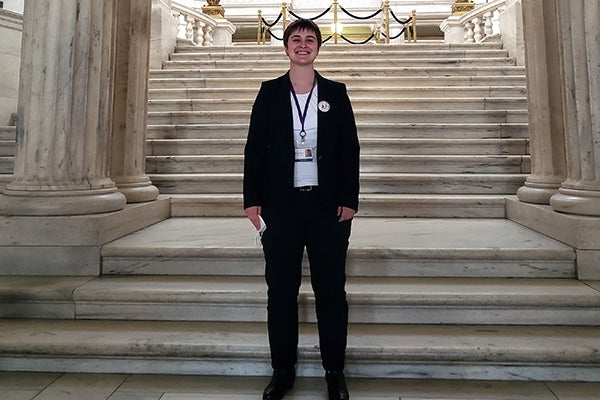Sarah Behm testifies in support of more education funding, plans for future advocacy role
A URI Human Development and Family Sciences student who also acts as an advocate for teachers and early childhood educators recently testified before the Rhode Island House Finance Committee, encouraging legislators to increase funding for early educators, who are among the lowest paid professionals.
Sarah Behm, a senior HDF major with a concentration in child and family development, testified on behalf of the Rhode Island Association for the Education of Young Children, where she serves as an intern. She encouraged the Finance Committee to increase funding for early childhood educators through the “Right from the Start” campaign, a legislative and budget campaign to advance state funding for young children and their families in Rhode Island.
“We support the Right from the State Campaign’s priorities for funding because we believe early childcare is an essential service to all,” Behm told the committee. “Passing this bill will help educators of young children dramatically by improving teacher retention, decreasing the number of teachers who have to rely on supplemental income, and encouraging more students to consider teaching as a profession. This will have significant effects not just on teachers, but also on the community as a whole. The benefits to passing this are endless.”
Watch the committee hearing here. Behm’s testimony begins at the 02:22:13 mark
Behm relayed to the committee the difficulties early childhood educators face, using her own experience as an example. Behm began pursuing the field after graduating high school, working at a family-run early childhood education center while studying education at the Community College of Rhode Island, but she didn’t realize the roadblocks she would have to navigate.
“My passion for teaching grew, both inside and outside the classroom. But, over the next few years, I would learn many lessons that would put into question my entire decision to be a teacher,” Behm said, noting she had to work multiple jobs while going to school to make ends meet. “I repeatedly had to sacrifice my time and my well-being to stay afloat. I could never take a day off. I could never schedule a doctor’s appointment without severe difficulties. And I couldn’t take time to socialize with others. This was my reality as an early childhood educator. I would not have been able to support myself if I was earning only the salary of a teacher.”
Behm rethought her career choices, transferring to URI and switching from a concentration in early childhood education to child and family development. She now aims to be an advocate for early childhood educators, leading to her internship with RIEYAC. She works with Professor Sue Adams, chairperson of the HDF department in the College of Health Sciences, to gather information on how the COVID-19 pandemic has affected childcare providers. She has also worked as a research assistant on early childhood grants, and helps provide coaching and resources to infant and toddler teachers through a partnership among URI, RIEYAC and the state Department of Human Services.
Upon graduating in May 2022, Behm plans to continue her advocacy track, and is considering pursuing a master of jurisprudence degree in child law to help her better advocate for early childhood teachers and childcare workers.
“Early childhood educators are not given the support they need to live full, healthy lives, which jeopardizes their well-being and that of their students,” Behm told the committee. “As I think about the future, I think about the crisis we continue to face as early childhood professionals. There are many others like me who have to leave because they are not paid a livable wage. Passing this bill will be a crucial building block toward fixing our childcare systems by starting with the early childhood educators who have continued working through these unprecedented times. If the pandemic has taught us anything, it’s that we can’t continue to underpay our teachers without putting the future of our children at risk.”

